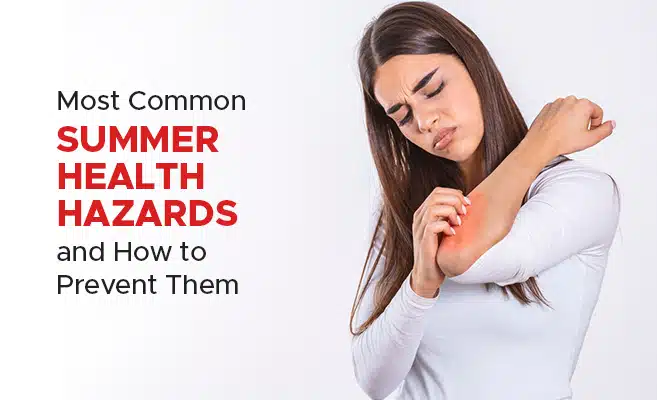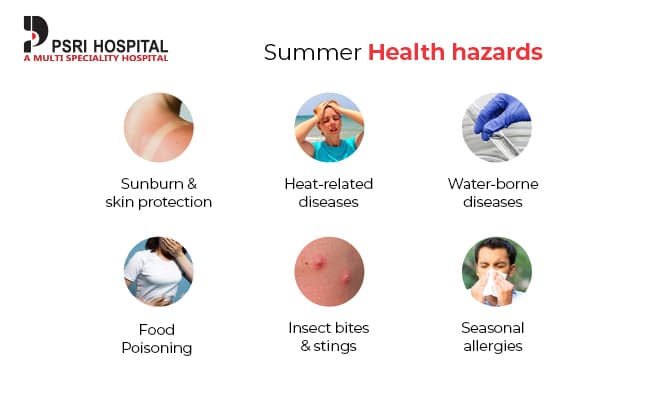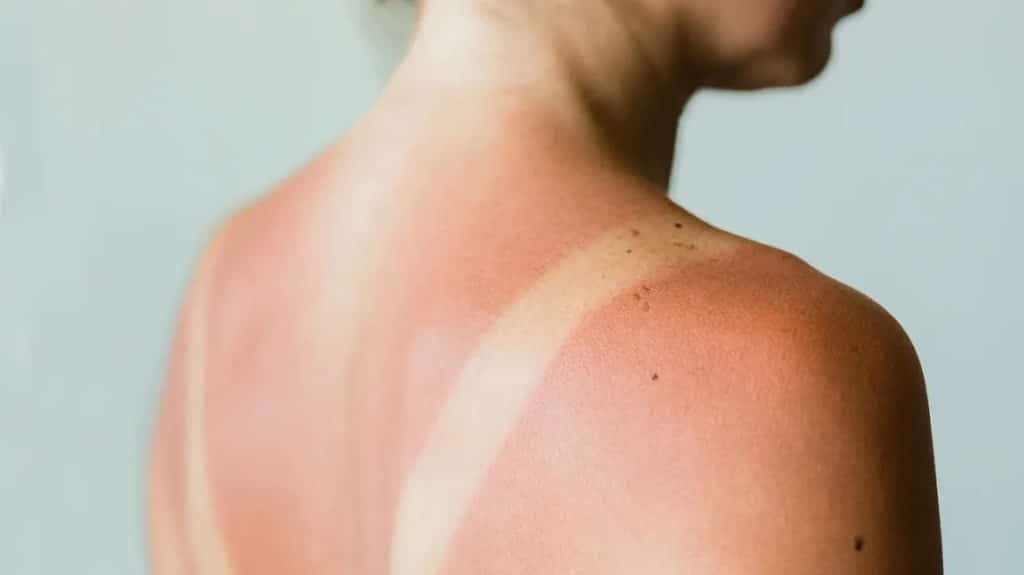Most Common Summer Health Hazards and How to Prevent Them

Summer can be a wonderful time with the sun making us feel happy and relaxed. But it also brings some challenges that can spoil our summer fun. We can face different health problems during this season, like getting sick from the heat or being bothered by insect bites.
But don’t worry! In this blog, we will talk about the most common health problems in summer and give you important information on how to avoid them.
So, whether you’re planning to have a barbecue in your backyard, going on an exciting hike, or simply enjoying the sun, join us as we explore the world of summer diseases and learn effective ways to have a safe and healthy summer full of fun.
Heat-related Diseases and Prevention Tips
Heat-related illnesses are among the most common summer health problems. Heat exhaustion or heat stroke can result from these illnesses when your body is unable to control its temperature.
Heat-related illnesses:
- Heat exhaustion and heat stroke are common during summer when your body struggles to regulate its temperature.
- Symptoms of heat exhaustion include heavy sweating, weakness, dizziness, and nausea.
- Heat stroke is more severe and can cause high body temperature, confusion, and loss of consciousness.
Prevention tips for heat-related illnesses:
- Stay hydrated by drinking plenty of fluids, especially water.
- Avoid being outdoors during the hottest hours of the day, typically between 10 am and 4 pm.
- Wear loose-fitting and light-colored clothing to help your body stay cool.
- Take frequent breaks in a cool and shaded area to rest and cool down.
- If you experience symptoms of heat exhaustion or heat stroke, seek immediate medical attention from a nearby hospital.
Summer Health Hazards

- Sunburn and skin protection: Sunburn is another common summer health problem that can cause pain, redness, and peeling of the skin.
- Heat-related diseases: They are among the most common summer health problems. Heat exhaustion or heat stroke can result from these diseases.
- Water-borne diseases: Most common summer health problems that can be acquired from swimming in dirty water are water-borne illnesses.
- Food Poisoning: Food poisoning is a typical summer health hazard that can be caused by eating contaminated food.
- Insect bites and stings: These includes insect bites and stings are common summer health hazards that can cause itching, swelling, and pain.
- Seasonal allergies: Seasonal allergies are common summer season diseases that can cause symptoms such as sneezing, runny nose, and itchy eyes.
Sunburn and Skin Protection

Sunburn is another common summer health problem that can cause pain, redness, and peeling of the skin. When your skin is left unprotected from the sun’s ultraviolet (UV) radiation for an extended period, sunburn occurs. Wearing protective clothes like caps and long sleeve shirts, applying sunscreen with at least SPF 30, and staying out of the sun during peak hours are all necessary measures to prevent sunburn.
It’s important to protect your skin from the long-term impacts of sun exposure, such as skin cancer and premature aging, in addition to avoiding sunburn. Wear sunscreen every day, even on cloudy days, and stay away from tanning booths to do this.
Water-borne Diseases And How to Avoid Them

Another one of the most common summer health problems that can be acquired from swimming in dirty water is water-borne illnesses. These conditions include respiratory infections, gastrointestinal disorders, and skin infections. Swimming in clean, well-kept pools or beaches, avoiding ingesting pool or beach water, and taking a shower before and after swimming are all helpful for preventing water-borne illnesses.
Food Poisoning and Food Safety During Summer

Food poisoning is a typical summer health hazard that can be caused by eating contaminated food. To prevent food poisoning, practicing good food safety habits such as washing your hands before and after handling food, keeping food at the proper temperature, and avoiding cross-contamination is essential.
Eating outdoors is also essential to be mindful of food safety in the summer. Keep foods such as meat, poultry, and dairy products in a cooler with plenty of ice, and avoid leaving food out in the sun for too long.
Insect Bites and Stings – Prevention, and Treatment
Other common summer health problems include insect bites and stings are common summer health hazards that can cause itching, swelling, and pain. To prevent insect bites and stings, it is vital to wear protective clothing such as long-sleeved shirts and pants, use insect repellent, and avoid wearing scented products.
If you are bitten or stung by an insect, remove the stinger if present, wash the area with soap and water, and apply a cold compress to reduce swelling and pain. If you experience an allergic reaction, seek medical attention immediately from the best hospital in Delhi.
Seasonal Allergies and Their Management
Seasonal allergies are common summer-season diseases that can cause symptoms such as sneezing, runny nose, and itchy eyes. Avoiding allergens such as pollen, keeping windows and doors closed, and using air conditioning is vital to managing seasonal allergies.
In addition, over-the-counter antihistamines and decongestants can help relieve allergy symptoms. If your symptoms are severe, however, it is crucial to seek medical attention.
Staying hydrated is crucial during summer, as hot and humid weather can lead to dehydration. Dehydration occurs when your body loses more fluids than it takes in, leading to symptoms such as thirst, dry mouth, and fatigue.
Drinking plenty of fluids such as water, sports drinks, and fruit juices is essential to stay hydrated. In addition, eat foods that are high in water content, such as fruits and vegetables.
Importance of Staying Hydrated During Summers

Staying hydrated is crucial during summer, as hot and humid weather can lead to dehydration. Dehydration occurs when your body loses more fluids than it takes in, leading to symptoms such as thirst, dry mouth, and fatigue.
Drinking plenty of fluids such as water, sports drinks, and fruit juices is essential to stay hydrated. In addition, eat foods that are high in water content, such as fruits and vegetables.
Swimming And Water Safety
Swimming is a popular summer activity, but it is important to practice water safety to prevent accidents and injuries. Continuously swim in designated areas with a lifeguard present, never swim alone, and avoid alcohol consumption while swimming.
In addition, it is crucial to be aware of the signs of drowning, such as difficulty breathing and inability to stay afloat. If you or someone you know is in danger, seek help immediately.
Common Summer Season Diseases and How to Prevent Them
In addition to the health hazards mentioned above, several other common summer season diseases can affect your body, such as colds, flu, and gastroenteritis. To prevent these illnesses, practicing good hygiene, such as washing your hands frequently, avoiding close contact with sick people, and staying home if you are unwell, is essential.
Best Hospital in Delhi for Summer Health Problems
If you experience any summer health problems, seeking medical attention from a reputable hospital such as PSRI Hospital in Delhi is essential. PSRI Hospital is a leading Delhi multispeciality hospital that offers a wide range of services for summer health problems such as heatstroke, food poisoning, and insect bites.
Conclusion
Summer is a season of fun and relaxation, but it is also a season of health hazards that can put a damper on your summer plans. By following the tips mentioned in this article, you can prevent common summer health problems and enjoy a healthy and safe summer. Remember to stay hydrated, wear protective clothing, practice good food safety habits, and seek medical attention if needed.
If you want to know more about how to prevent summer diseases or want the required treatment, PSRI Hospital‘s expert team is here to help you. Our expert can give you the best course of action and treatment to make your summer more enjoyable and disease-free.
FAQs
Q 1: What are the most common summer health hazards?
Ans: The most common summer health hazards include heat-related illnesses like heat stroke and heat exhaustion, sunburns, dehydration, foodborne illnesses, and insect bites.
Q 2: How can I prevent heat-related illnesses during the summer?
Ans: To prevent heat-related illnesses, it’s important to stay hydrated by drinking plenty of water, avoiding prolonged exposure to the sun during peak hours, wearing lightweight and breathable clothing, and seeking shade or cool areas whenever possible. Additionally, taking regular breaks in air-conditioned spaces and using fans or misting devices can help regulate body temperature.
Q 3: What are some effective ways to prevent sunburns?
Ans: To prevent sunburns, apply a broad-spectrum sunscreen with an SPF of 30 or higher before heading outdoors, and reapply every two hours or after swimming or sweating. Seek shade when the sun’s rays are strongest, typically between 10 a.m. and 4 p.m., and wear protective clothing, such as wide-brimmed hats and sunglasses.
Q 4: How can I prevent dehydration in the summer?
Ans: To prevent dehydration, drink plenty of fluids throughout the day, even if you don’t feel thirsty. Opt for water, sports drinks, or electrolyte-rich beverages to replenish lost minerals. Avoid excessive consumption of caffeinated and alcoholic beverages as they can contribute to dehydration. Additionally, eat water-rich foods like fruits and vegetables and limit intense physical activity during the hottest hours of the day.
Q 5: How do I prevent insect bites and diseases transmitted by insects?
Ans: To prevent insect bites, wear light-colored, long-sleeved clothing and use insect repellent containing DEET or other recommended ingredients. Avoid stagnant water areas where mosquitoes breed, and use screens on windows and doors to keep bugs out.

 Book An Appointment
Book An Appointment Virtual Consultation
Virtual Consultation





